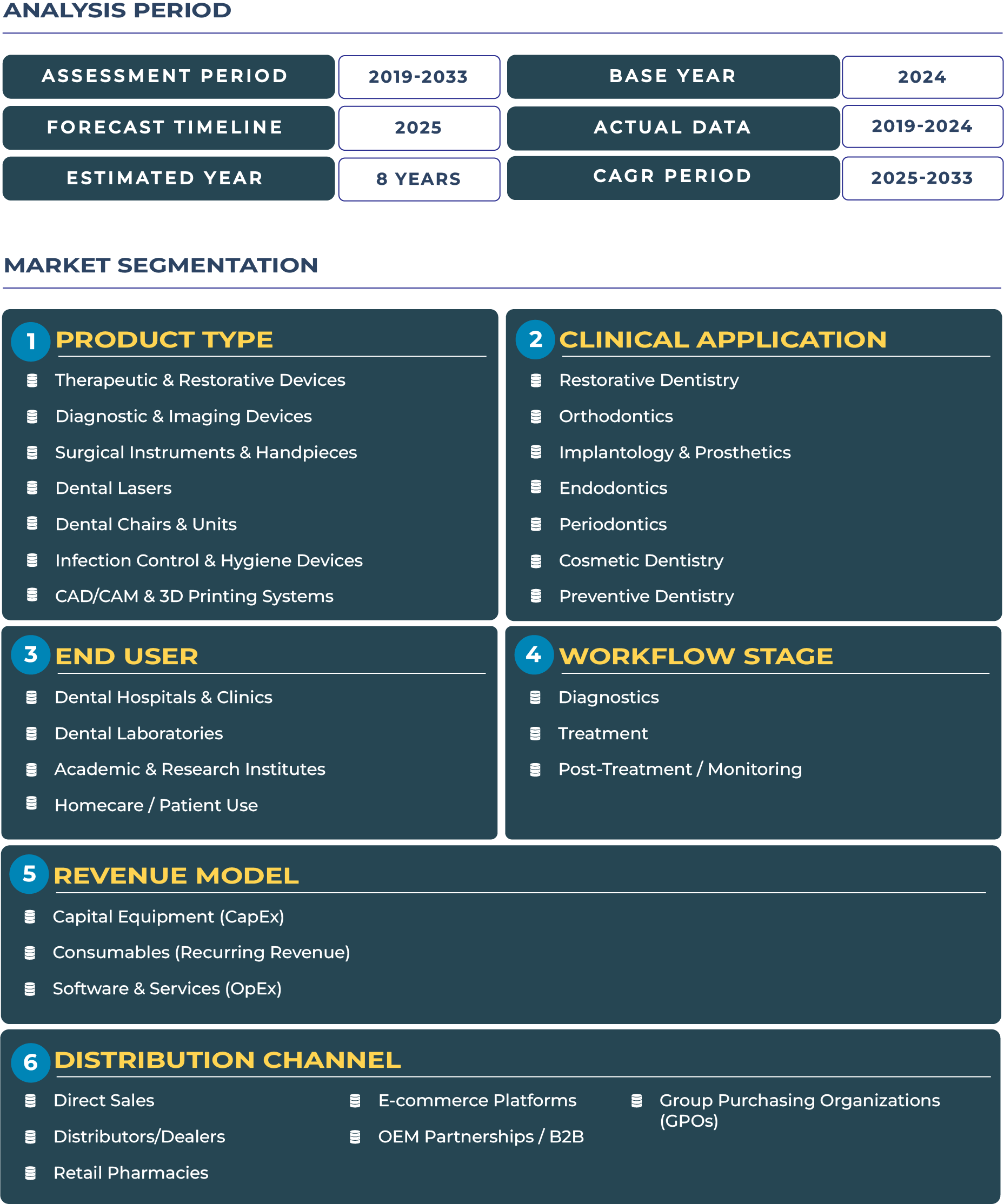Nigeria Dental Devices Market Outlook: Urbanization Driving New Growth Horizons
Nigeria dental devices market is undergoing a structural transformation shaped by rapid urbanization and growing awareness of oral health. The country’s expanding urban middle class, concentrated in hubs like Lagos and Abuja, is fueling demand for advanced dental solutions ranging from therapeutic and restorative devices to CAD/CAM and 3D printing systems. Despite income disparities and infrastructure challenges, the market has shown resilience and strong growth momentum. Valued at USD 103.4 million in 2025, the Nigeria dental devices market is projected to reach USD 236.6 million by 2033, growing at a CAGR of 10.9% (2025–2033). This expansion is driven by rising urban clinic investments, international distributor partnerships, and demand for affordable digital solutions tailored for emerging markets.
How Urban Middle Class Growth Is Reshaping Nigeria Dental Devices Industry
Urbanization is the cornerstone of Nigeria dental devices market expansion. Lagos, with its dynamic mix of private clinics, international partnerships, and rising disposable incomes, has become the primary hub for dental technology adoption. Abuja follows closely with a rapid increase in dental chain clinics and outpatient facilities offering diagnostic imaging devices, dental chairs and units, and infection control systems. Nigeria’s youthful demographic profile also creates a long-term market for orthodontics and prosthetics, highlighting opportunities for restorative devices. Furthermore, increased healthcare financing initiatives and remittance-linked spending from diaspora communities are bridging affordability gaps. These combined forces make Nigeria a fast-growing destination for global dental equipment suppliers and investors seeking new opportunities in Sub-Saharan Africa.
Key Drivers and Restraints: Understanding Nigeria Dental Devices Market Dynamics
Drivers of Growth
The primary driver of Nigeria dental devices industry is its large population with a growing urban middle class increasingly seeking high-quality dental care. Rapid private clinic openings in Lagos and Abuja are equipping their facilities with dental lasers, surgical handpieces, and other advanced technologies to differentiate from public facilities. International investors are also targeting Nigeria’s market through distributor financing models and consumable supply chains, enhancing accessibility to advanced dental tools. Additionally, the sophistication of local distributors has improved significantly, ensuring faster imports, after-sales service, and training support for practitioners across major metros.
Restraints Challenging Market Expansion
Despite these positives, challenges remain. Nigeria’s public health infrastructure for dental care is underdeveloped, creating gaps in rural and semi-urban regions. Price sensitivity is another critical issue, with many households unable to afford premium devices, leading to reliance on low-cost or refurbished equipment. Furthermore, logistics and security challenges in certain parts of the country affect supply chain reliability, particularly for delicate imaging devices and high-value CAD/CAM systems. These barriers emphasize the importance of scalable, low-cost, and distributor-led solutions tailored for the Nigerian dental devices ecosystem.
Trends and Opportunities: Where the Nigeria Dental Devices Market Is Headed
Emerging Trends
One of the most notable trends is the expansion of urban private dental chains in Lagos, Abuja, and Port Harcourt. These facilities are increasingly investing in dental consumables and hygiene devices to serve a rising base of patients. Foreign investors are expressing strong interest in Nigeria’s urban clinic sector, with private equity funds and diaspora-backed ventures entering the dental devices market. Rising demand for consumables, orthodontic products, and preventive care solutions in metros highlights the growing sophistication of patient needs.
Opportunities Shaping the Future
The Nigeria dental devices sector offers unique opportunities. Establishing Lagos and Abuja micro-hubs can reduce lead times and ensure reliable last-mile delivery. Companies can also introduce affordable digital scanners and consumable bundles to meet the budget expectations of local clinics. Moreover, partnering with fintech providers to develop remittance-linked financing solutions could make advanced dental devices more accessible to middle-income households. Collectively, these opportunities position Nigeria as one of the most promising growth markets in Africa for dental device innovation.
Competitive Landscape: Building Sustainable Growth in Nigeria Dental Devices Sector
Nigeria’s competitive dental devices landscape is being shaped by both local distributors and international manufacturers. Global companies such as Straumann are expanding their footprint through partnerships with local distributors, offering premium implants and restorative solutions. Meanwhile, Nigerian distributors are playing a central role by bundling low-cost CAD/CAM systems with consumables, enhancing adoption among clinics with limited capital. Between 2022 and 2025, multiple private clinic expansions were reported in Lagos and Abuja, backed by foreign investors seeking to address the growing demand for urban dental services. Micro-hub strategies and consumable-focused business models are proving effective in tackling logistics and affordability challenges. The Nigeria dental devices ecosystem is poised for accelerated transformation as companies blend advanced technology with cost-sensitive strategies tailored to the urban consumer base.







